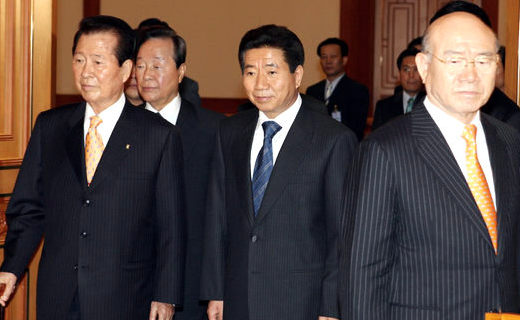 |
|
The current president Roh Moo-hyun (second from right) invited former presidents including Kim Dae-jung (far left), Kim Young-sam (second from left) and Chun Doo-hwan (far right) to the presidential office, Cheong Hwa Dae, on October 10.
|
U.S. ambassador urges S.K. participation
"South Korea plans to join the U.S.-led Proliferation Security Initiative (PSI) on a partial and case-by-case basis," South Korean vice foreign minister Yoo Myeong-hwan said at a parliamentary meeting on October 10. The minister was cautiously referring to potential sanctions against North Korea following its declared nuclear test on October 9. U.S. ambassador to South Korea Alexander Vershbow said on the same day, "I hope the South Korean government increases its participation in the PSI after the North’s nuclear test." In a press conference with local media, Vershbow said that when U.S. undersecretary of state Robert Joseph visits South Korea, discussion will be held regarding South Korea’s participation in the PSI. The PSI is a U.S.-led international pact of cooperation, aimed at quelling the distribution of weapons of mass destruction. Some 70 countries support the PSI, with members sharing information and intelligence surveillance. A U.S. draft proposal for the U.N. Security Council resolution against North Korea following the nuclear test - a resolution still in the works at U.N. headquarters in New York - included the search of all freight ships coming in and out of the North. If the resolution is endorsed, South Korea will consider searching North Korean ships, as well, a senior government official said. Asked about the future prospects for the joint Korean Gaeseong (Kaesong) Industrial Complex and tours of the North’s Mt. Geumgang (Kumkang), Ambassador Vershbow said he would not guess as to what specific measures the South Korean government will take. It is time for all governments to reconsider all aid programs that financially benefit the North’s regime, he said. The U.S. envoy said the use of Chapter VII of the U.N. Charter would not mean military action against North Korea. The use of the chapter in the resolution may involve further economic sanctions, he said. "The North’s nuclear test makes direct talks with the U.S. more difficult." In a parliamentary meeting on the same day, Unification Minister Lee Jong-seok said, "A certain level of change in our North Korean policy is unavoidable after the nuclear test." Meanwhile, in a meeting with leaders of political parties, President Roh Moo-hyun said he would thoroughly gauge the nuclear test’s impact on the pending issue of South Korea’s regaining wartime military control from the U.S. "[The test] does not mean a change in our policy. I will consider whether there will be any change under the new situation," President Roh said.





